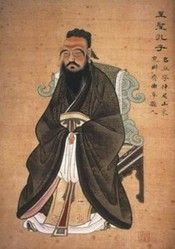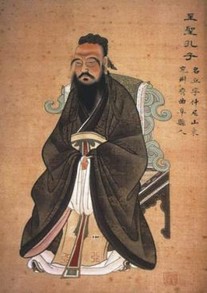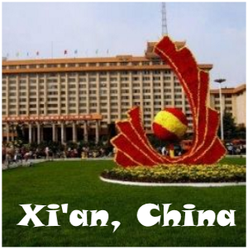
Confucius
by NAIZA
Confucius, 551-479, was a Chinese political figure, educator and social thinker who founded Confucianism in the time of Zhou Dynasty in China.
Born in the Lu State located in the south of modern-day Shandong province in China, he was named Kong Qiu. He came from a family of warriors. His father Shulianghe was a famous warrior and owned a fiefdom who got killed when he was three years old.
Since Kong Qiu's father died he lived with her mother out of the fiefdom to escape humiliation from his father's formal wife. Thus, all his childhood he lived in poverty with his mother. He also had to overcome many obstacles just to finish his studies with the encouragement from his mother.
Eventually, when he was seventeen years old his mother died because of illness and hard work. After three years, he married a mild tempered woman from Quigan family of the Song State. Until he felt there are some changes he will be needing to sacrifice to revive the virtues of the Huaxia, an early Chinese civilization and the Western Zhou Dynasty to build a harmonious relation in its territory.
There he decided to study the socio-political philosophies that applies to any human relation and because of Confucius influences and deeper thinking he was regarded as the Socrates of East.
Confucius Teachings and Influences
Most of Confucius teachings and conversations with his followers can be found in the Lunyu or the Analects of Confucius written during the spring and autumn in the Warring States Period in China. It has a tremendous influence on Chinese and Eastern culture, thought and values until this modern day.
He believes that people live their lives in the parameters of heaven with a purposeful Supreme Being as well as nature and its a fixed cycles of pattern that in life man is the one who is responsible for its actions and the treatment of others.
He often represented his teachings from antiquity and he reflects on life through his reliance on and love for ancients. Part of his social philosophy revolves around the concept of Ren, compassion or loving others such as to avoid artful speech and false impression on others. His deep concern for others persuade his followers to practice the Golden Rule:What you do not wish for yourself, do not do to others."
Confucius also advocates the importance of education and study as way of understanding and to relate to human affairs and emotion. For him the value of study means finding a good teacher and imitating his words and deeds. One of the best example of attaining moral education can be found in the Book of Songs in the Bible because of its beautiful poems and verses. Recent archaeological discoveries in China found Confucius lost manuscripts which reveals some of idealism regarding the importance of education and moral values as a part of good living.
He also focuses his political philosophy in the belief that a characteristic of a good ruler should learn self-discipline and must live by example and treat his followers with love and concern. He quoted saying, "Good government consists in the ruler being a ruler, the minister being a minister, the father being a father, and the son being a son.” To him what characterize a superior ruler-ship through a possession of a virtue. By having a virtue enabled a ruler to maintain a good order in his state without troubling himself and relying on loyal and effective deputies.
Confucius also advocates the importance of education and study as way of understanding and to relate to human affairs and emotion. For him the value of study means finding a good teacher and imitating his words and deeds. One of the best example of attaining moral education can be found in the Book of Songs in the Bible because of its beautiful poems and verses. Recent archaeological discoveries in China found Confucius lost manuscripts which reveals some of idealism regarding the importance of education and moral values as a part of good living.
| The Analects of Confucius: A Philosophical Translation (Classics of Ancient China) "To quietly persevere in storing up what is learned, to continue studying without respite, to instruct others without growing weary--is this not me?"--ConfuciusConfucius is ... Ballantine Books |
| The Authentic Confucius: A Life of Thought and Politics For more than two thousand years, Confucius has been an inseparable part of China's history. Yet despite this fame,Confucius the man has been elusive. Now, in The Authentic ... Scribner Only $20.19 |
| The Teachings of Confucius - Special Edition The teachings of Confucius have had as great an impact on the culture of the Far East as the Bible has had on that of West. As they are presented in this deluxe, hardcover ... El Paso Norte Press |
| Confucius: Golden Rule, The Born in China in 551 B. C., Confucius rose from poverty to the heights of his country's ruling class. But then he quit his high post for the life of an itinerant philosopher. ... Arthur A. Levine Books |
| Confucius from the Heart: Ancient Wisdom for Today's World As one of Chinas's all-time bestsellers, Confucius from the Heart unveils the wisdom of The Analects, a major text of Confucian philosophy that has dominated Chinas's ... Atria Books |
| Chinese LiteratureComprising the Analects of Confucius, the Sayings of Mencius, the Shi-King, ... This book was converted from its physical edition to the digital format by a community of volunteers. You may find it for free on the web. Purchase of the Kindle edition ... Public Domain Books Only $0.00 |
| The Analects of Confucius The Analects of Confucius is one of the central books of Chinese literature and Chinese thought; memorized and studied for many centuries, it has been certainly one of the ... Vintage Only $12.49 |
| The Essential Confucius A deluxe paperback edition: Thomas Cleary's brilliant translation of the sayings of Confucius presented in the order of the 64 classic I Ching hexagrams. HarperOne |
| The Analects of Confucius (Lun Yu) In the long river of human history, if one person can represent the civilization of a whole nation, it is perhaps Master Kong, better known as Confucius in the West. If there ... Oxford University Press, USA |
| Thinking Through Confucius (SUNY Series in Systematic Philosophy) State University of New York Press |
| The Ethics of Confucius The Works of Confucius, His Disciples, and Most Important FollowersConfuciusChapter I. What Constitutes the Superior ManChapter II. Self-DevelopmentChapter III. General Human ... Only $3.99 |
| The Analects of Confucius (Translations from the Asian Classics) Compiled by disciples of Confucius in the centuries following his death in 479 B.C.E., The Analects of Confucius is a collection of aphorisms and historical anecdotes ... Columbia University Press |
Confucius Biography on Video
Confucius Passages & Words To Live By
Here are some well known passages and saying by Confucius.
To know your faults and be able to change is the greatest virtue.
- What you do not wish for yourself, do not do to others.
- With coarse rice to eat, with water to drink, and my crooked arm for a pillow - is not joy to be found therein? Riches and honors acquired through unrighteousness are to me as the floating clouds.
- Knowledge is recognizing what you know and what you don't.
- Reviewing the day's lessons. Isn't it joyful? Friends come from far. Isn't it delightful? One has never been angry at other's misunderstanding. Isn't he a respectable man?
- In bed he avoided lying in the posture of a corpse … On meeting anyone in deep mourning he must bow across the bar of his chariot.
- You may rob the Three Armies of their commander, but you cannot deprive the humblest peasant of his opinion.
- If the people be led by laws, and uniformity among them be sought by punishments, they will try to escape punishment and have no sense of shame. If they are led by virtue, and uniformity sought among them through the practice of ritual propriety, they will possess a sense of shame and come to you of their own accord.
- If your desire is for good, the people will be good. The moral character of the ruler is the wind; the moral character of those beneath him is the grass. When the wind blows, the grass bends.
- He who governs by means of his virtue is, to use an analogy, like the pole-star: it remains in its place while all the lesser stars do homage to it.
- He who learns but does not think is lost. He who thinks but does not learn is in great danger.
- I only instruct the eager and enlighten the fervent. If I hold up one corner and a student cannot come back to me with the other three, I do not go on with the lesson.
Downfall and Legacy of Confucius
The life of Confucius is such a remarkable epic drama due to his huge impact he made on the lives of many people through his inspiring teachings and legacy that still passed in after generation after generation.
Before his death, he was invited to lead the Kingdom of Lu as a new premier because of his impressive idealism and administrative knowledge. As a new premier of the Kingdom of Lu, he began to renovate the internal political structure in Lu. With his idealism he applied the concept of Li, based on a three important aspects of life: ceremonies associated with sacrifice to ancestors and deities of various types, social and political institutions, and the etiquette of daily behavior.
Due to his hard work and determination to attain the change, at last the minds of the people in Lu became stable and act accordingly to what Confucius taught them. Their economy began to prosper and their kingdom became a threat to other kingdoms because of its success.
Until Qi, a kingdom who tried to conquer Lu challenge the people of Lu and Confucius abilities to remain on his track. Qi formulated a tactics and scheme by bringing 80 beautiful women later accused the King as being lustful. The plot of his downfall became successful that pushed Confucius to resign as the King of Lu.
After his ouster, he realize how he no longer appeal to the people of Lu so he decided to go on a journey with his disciples to find a great and ideal King but he still his unsuccessful. At the age of 68, he returned to Lu and edited two of his famous books which chronological his all his journey and the previous dynasties he went on.
Many believe that Confucius died at the age around 71 to 72 years old 479 BCE at Qufu, Zhou Dynasty in early China where the tomb of Confucius can be found as well as the The Daecheng Hall, the main hall in the temple of Confucius.
Majestic Attraction in Confucius Temple in China
 Confucius |  Confucius |
 Confucius Say |  Confucius |
 Confucius Temple in... |  Confucius |
You might also like
Xi'an - Not Just Terracotta WarriorsA unique experience awaits Western tourists who stay for a week or more in Xi...
Finding a Bar in Suzhou, ChinaA look at some of the better pubs and bars in the Chinese city of Suzhou.




 Making Kimchi Pancakes -on 10/30/2012
Making Kimchi Pancakes -on 10/30/2012
 Leonardo da Vincion 06/01/2011
Leonardo da Vincion 06/01/2011
 Porphyraon 06/01/2011
Porphyraon 06/01/2011
 The Philippine Eagleon 05/31/2011
The Philippine Eagleon 05/31/2011



What can you say about Confucius
I follow him on Twitter.
@ConfuciusPosts ( https://twitter.com/ConfuciusPosts )
Very wise man indeed.
Very informative and great presentation of the post
Regards
Great history lesson
Very interesting topic. I believe also in a purposeful Supreme Being, but that being is God, Jesus and Holy Spirit. Great article. Very well written. I love your work as always.